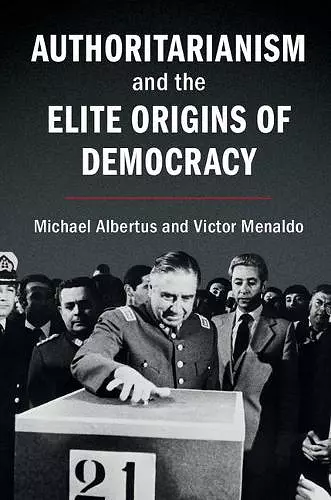Authoritarianism and the Elite Origins of Democracy
Understanding the interplay between authoritarianism and democracy
Michael Albertus author Victor Menaldo author
Format:Paperback
Publisher:Cambridge University Press
Published:25th Jan '18
Currently unavailable, and unfortunately no date known when it will be back
This paperback is available in another edition too:
- Hardback£87.99(9781107199828)

This insightful work examines how autocratic legacies influence democratic transitions, revealing the ongoing advantages for former elites. Authoritarianism and the Elite Origins of Democracy offers a comprehensive analysis.
In Authoritarianism and the Elite Origins of Democracy, the authors delve into the intricate relationship between democracy and the remnants of autocratic rule. They explore how the legacies of previous dictatorships can persist even after a transition to democratic governance. This examination highlights the paradox of democratization, where those who once thrived under authoritarian regimes often maintain their advantages in the new political landscape. The book addresses profound questions that resonate with scholars, policymakers, and general readers alike, shedding light on the complexities of political evolution.
The authors argue that the design of democratic institutions is frequently influenced by the very authoritarian regimes that they replace. These institutions are often crafted to protect the interests of outgoing elites, allowing them to retain power and privilege even in a supposedly democratic system. Through a detailed analysis, Authoritarianism and the Elite Origins of Democracy uncovers the mechanisms employed by authoritarian leaders, such as electoral system configurations and legal immunities, which create barriers to genuine democratic reform.
By examining global data from 1800 to the present, along with case studies from Chile and Sweden, the book provides a comprehensive overview of how some democracies manage to reform their elitist structures. The authors present a novel theory of regime transitions and outcomes, offering insights into why certain democracies succeed in evolving towards more equitable governance while others remain trapped in cycles of elite dominance.
'In this important and original study Albertus and Menaldo help answer a critical question for comparative politics - why do democratic transitions so often fail to eliminate elite dominance of a country's politics? Their conclusions will be of interest to a very wide range of scholars.' David Stasavage, Julius Silver Professor, New York University
'Albertus and Menaldo offer an audacious set of claims supported with rigorous and rich comparative and historical research. Democracy's success (or failure) depends not on the people but on the competition among elites. The origins of nearly all democracies are in elite bargains, renegotiations among elites are generally what sustain democracy, and the failure of elites to reach agreements is what dooms them. Thus, it should be no surprise that inequality is generally part and parcel of democratic polities and that authoritarianism is often a short step away. This exciting reinterpretation of the historical record offers a new perspective on the problems confronting contemporary governments.' Margaret Levi, Sara Miller McCune Director, Stanford University
'For generations scholars have seen democratic transitions as triumphant moments of victory by the shackled masses. But what if old authoritarian elites are able to maintain many of their privileges and powers under democracy? In Albertus and Menaldo's groundbreaking new work they show that outgoing elites are often able to 'game' democracy by structuring the transition and developing democratic institutions that continue to represent their interests. With this powerful new view of the origins and success of democracy, developed through a wide array of convincing historical and statistical analysis, the authors fundamentally reshape the way we think about elites and democracy.' Ben Ansel, University of Oxford
'Authoritarianism and the Elite Origins of Democracy simultaneously takes aim at distributive understandings of democratic origins and those who argue that inequality stems from global capitalism. Amassing a powerful array of evidence across time and geographic space, Michael Albertus and Victor Menaldo show that elite-biased democracy both explains democratization under high inequality and the persistence and expansion of that inequality. I harbor no illusions that this book will end the debates over democracy's origins and quality, but it greatly enriches and will invigorate them both.' Benjamin Smith, University of Florida
'… Authoritarianism and the Elite Origins of Democracy is an outstanding book. It brings to light crucial elements of why democracy so often fails to fulfill its promises. The variety of methodological approaches enhances the book.' Marie-Josée Lavallée, H-Socialisms
'The book represents an important contribution to the study of democratization and opens new horizons for students of the quality of democracy as well as authoritarian regime survival.' Jia Li, Democratization
'… an excellent contribution not only to a more nuanced understanding of democracy, authoritarianism, and the processes of democratization and liberalization, but, also in a more indirect and subtle way, the fruition of a robust and realistic line of approach exploring the logic of public choice phenomena and collective decision making in both democratic and non-democratic settings.' Paul Dragos Aligica, Public Choice
ISBN: 9781316649039
Dimensions: 228mm x 152mm x 19mm
Weight: 490g
322 pages